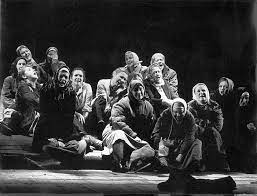
Part of Lincoln Center Festival 2000, this stage adaptation of Fyodor Abramov's trilogy of life in Russia's Far North continues over a second evening to show the same village five years after the end of WWII. In this more somber Part II, the villagers' mood is temporarily lifted by a film clip of smiling peasants harvesting wheat -- until it is announced that the state grain requirement will be doubled. This effectively condemns them to another year of near famine; forced "loans" to the Party district committee further bled them. New Chairman Ivan (Nikolai Lavrov), who has also become husband to Anfisa (Tatyana Shestakova), offers the peasants extra grain to encourage them to build a winter cowshed, but he's jailed for his "generosity." Varvara (the excellent Natalya Fomenko), now a cleaning woman in a government office in town but with bread to eat, befriends Anfisa, who comes to petition for Ivan's release. As deputy village Chairman, Mikhail (Pyotr Semak) learns firsthand the frustrations of being unjust to people he liked. In the chilling conclusion, he and his sister Lizka (Natalya Akimova), in the meantime married to a more violent Yegorsha (Sergei Vlasov), sign a clemency petition on behalf of Ivan, knowing that it might ruin them. While Abramov/Dodin vilifies District Committee representative Gavrila (Sergei Bekhterev), they are unexpectedly sympathetic to the succession of elected village chairmen that bend the rules so their people could survive. Throughout, it's clear the villagers want most of all to hear that things will get better; their belief in the future is what sustains them. As in the first part, one wants larger stage personalities to fill the major roles. True, the characters are supposed to be villagers, but great theater has its own reality. The scene with the depleted Varvara would be even more powerful were Anfisa a stronger and more complex stage personality. Perhaps in trying to keep the presentation uncomplicated, Dodin inadvertently makes some supporting parts more prominent, particularly in the case of the older women, played by Maly's veteran actresses.
